Marco Rubio says Trump seeking ‘limelight’ with proposal banning Muslims
- Share via
By the numbers
Welcome to Trail Guide, your host through the wilds of the 2016 presidential campaign. It's Sunday, Dec. 13, and here's what we're talking about:
- Marco Rubio says Trump is seeking the "limelight" with his proposal to ban Muslims.
- Donald Trump warns Republican leaders against talk of efforts to block him at this summer's nominating convention. He also says he disagrees with Supreme Court Justice Antonin Scalia's recent criticism of affirmative action.
- A new poll from the Des Moines Register/Bloomberg Politics shows Texas Sen. Ted Cruz surging in Iowa.
- Rand Paul remains on the main debate stage as Chris Christie bounces back.
- Stay up-to-date on the 14 candidates vying for the GOP nomination ahead of Tuesday's debate in Las Vegas.
Nine candidates will be onstage at the GOP debate -- get to know them
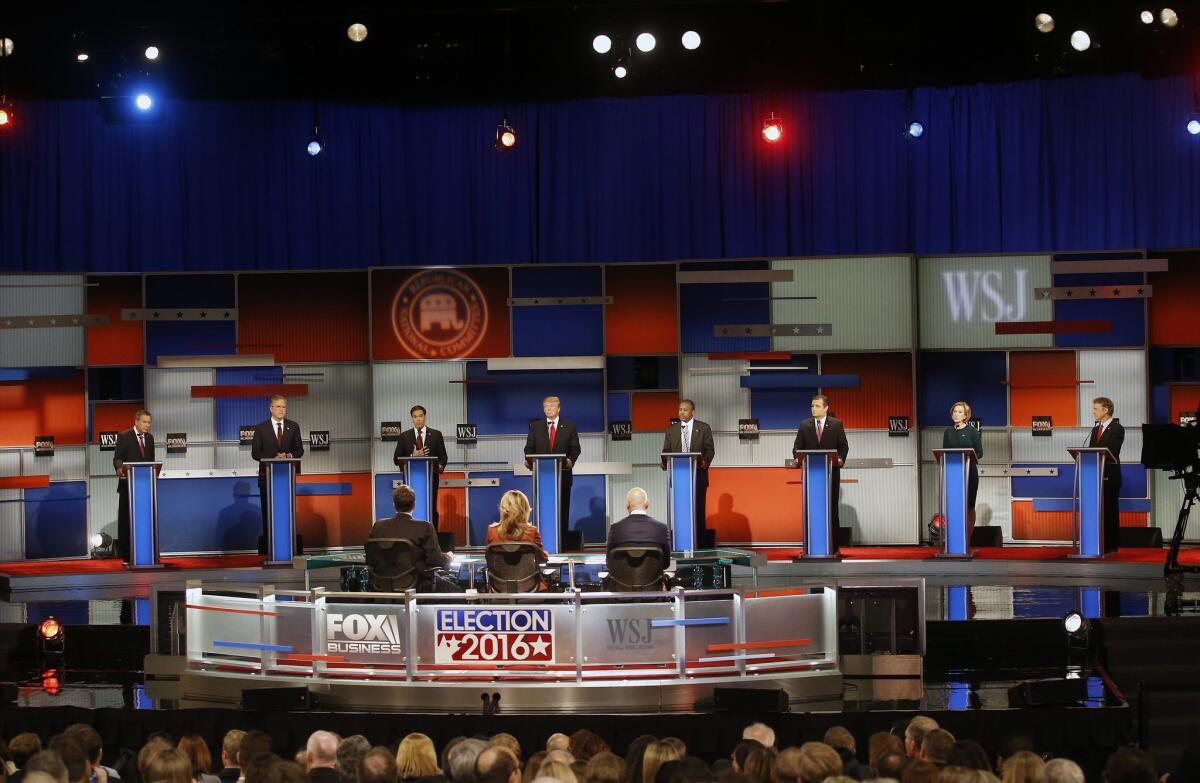
Republican presidential candidates John Kasich, Jeb Bush, Marco Rubio, Donald Trump, Ben Carson, Ted Cruz, Carly Fiorina and Rand Paul appear during Republican presidential debate at the Milwaukee Theatre.
New Jersey Gov. Chris Christie, after being pushed to the undercard debate last month, joins eight others on the main debate stage Tuesday night in Las Vegas.
Stay up to date on the candidates in this final debate before the new year.
A possible first question during Tuesday's debate?
In Iowa, Bernie Sanders offers a blunt assessment of his campaign
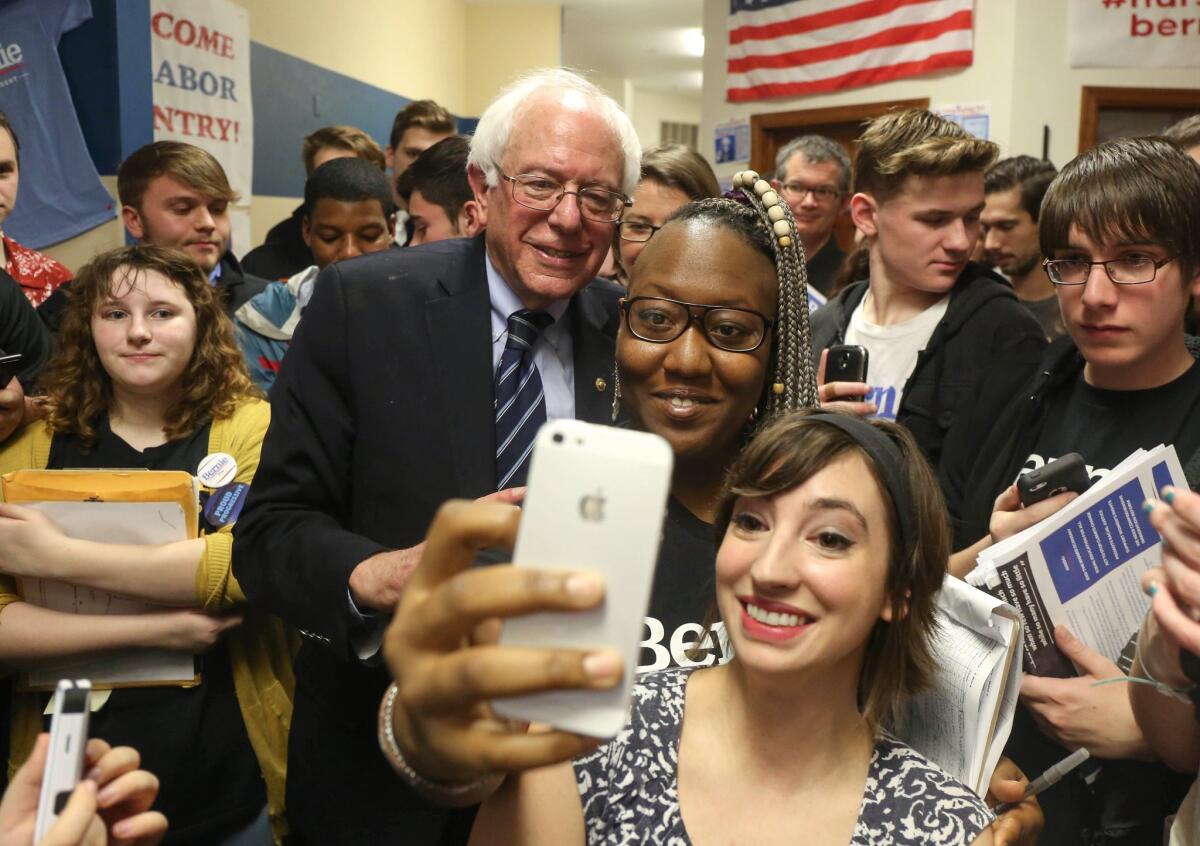
Vermont Sen. Bernie Sanders, running for U.S. president as a Democrat, poses for a selfie with supporters at his campaign office on Sunday, Dec. 13, 2015, in Waterloo, Iowa. (Bryon Houlgrave/The Register via AP)
It’s not something you expect to hear from a presidential candidate, especially when votes are set to be cast in less than two months.
But Vermont Sen. Bernie Sanders, who is vying for the Democratic nomination, offered this blunt analysis of his Iowa campaign on Sunday: He’s not well known in the Hawkeye State.
“The problem we have is I am not all that well known in Iowa,” said Sanders while speaking to volunteers in Waterloo, a town about 100 miles northeast of the capital city of Des Moines. “We win in Iowa, we win in New Hampshire, we have a path toward victory.”
For Sanders, who has served at times as an appealing alternative for liberals to Democratic frontrunner Hillary Clinton, Iowa is indeed an uphill climb. After losing the 2008 Democratic caucuses to then-Sen. Barack Obama, Clinton has built a strong ground operation in the state and spent considerable amounts of time making inroads with caucus-goers.
And, based on recent polls, it appears to be working.
A Fox News poll released last week, showed Clinton leading Sanders by 14 percentage points in Iowa. Her lead over Sanders was similar in a Monmouth University poll of Iowa Democratic caucus-goers also released last week.
On Sunday, Sanders, who has tried to broaden his appeal to more than just college-educated whites, visited a black church in Waterloo. In what’s become a common theme of his campaign, he spoke of income inequality and ending mass incarceration.
His words were met with numerous “amens” and “that’s right,” according to a pool report of the visit.
Surveys have shown that black voters, a key voting bloc in Democratic primaries, know little about Sanders.
Last week, he traveled to the Baltimore neighborhood of Freddie Gray, a 25-year-old black man who died last spring after his spine was partially severed while he was in police custody. Several weeks of unrest ensued in the city following Gray’s death.
Marco Rubio says Trump seeking 'limelight' with proposal banning Muslims
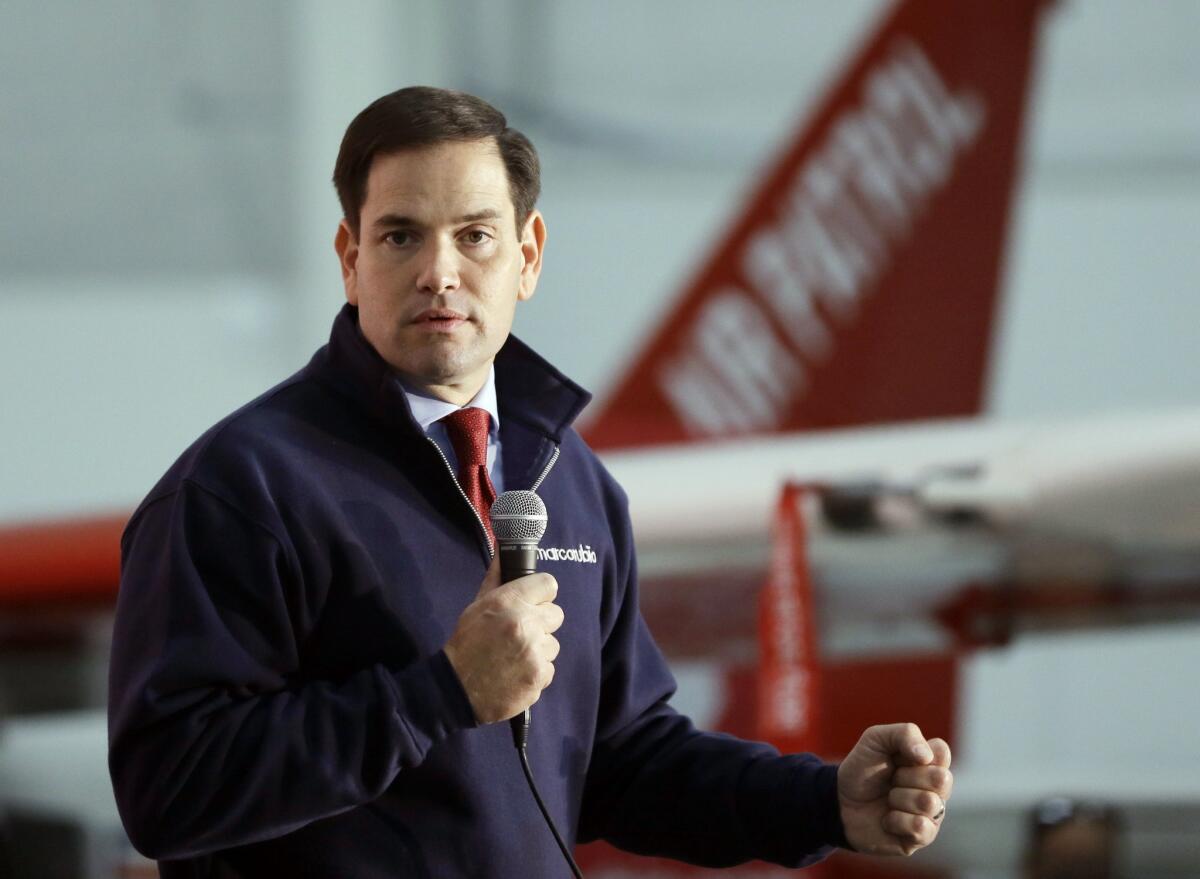
Republican presidential candidate Sen. Marco Rubio (R-Fla.) campaigning this week: What is he really bragging about?
Sen. Marco Rubio dismissed Republican presidential front-runner Donald Trump’s recent calls for a “complete shutdown” of Muslims entering the country as an attempt to regain traction after slipping in recent polls.
“If you look at the statements he made this week, obviously I think he made them partially to recapture the limelight after having lost it," Rubio said Sunday in an interview on NBC’s “Meet the Press.”
Recent polls from Iowa, the state where caucus-goers will kick off the 2016 primary season on Feb. 1, show Trump trailing Texas Sen. Ted Cruz. A Monmouth University poll – released on Monday just hours before Trump’s proposal was unveiled – showed Cruz with a 5 percentage point lead over Trump. A Des Moines Register/Bloomberg Politics poll from Saturday showed Cruz leading Trump by 10 percentage points.
Rubio, who in early nominating states and nationally remains positioned in the top tier of the 14 candidate field, has denounced Trump’s proposal barring Muslims. On Sunday he said that the best way for the United States to combat Islamic State-inspired extremism is to work alongside Muslim communities.
"The practical reality [is] that in order for us to identify homegrown violent extremism and prevent it or root it out before it takes action, we are going to need the cooperation of Muslim communities in this country," he said.
He took aim at Trump for what he said was the billionaire business tycoon’s inability to “articulate" an understanding of issues abroad.
“Foreign policy presents us often with hard choices, not black or white choices,” he said. “Oftentimes, your choices are down to two less than ideal outcomes, but you have to choose which one is the best one for the country. I personally believe [Trump] continues to struggle to articulate that.”
In an NBC News/Wall Street Journal poll released Sunday, Rubio was in third place nationally at 15%, trailing Trump (27%) and Cruz (22%) among likely Republican primary voters.
Safe spot on main debate stage is a boost for Rand Paul’s struggling campaign
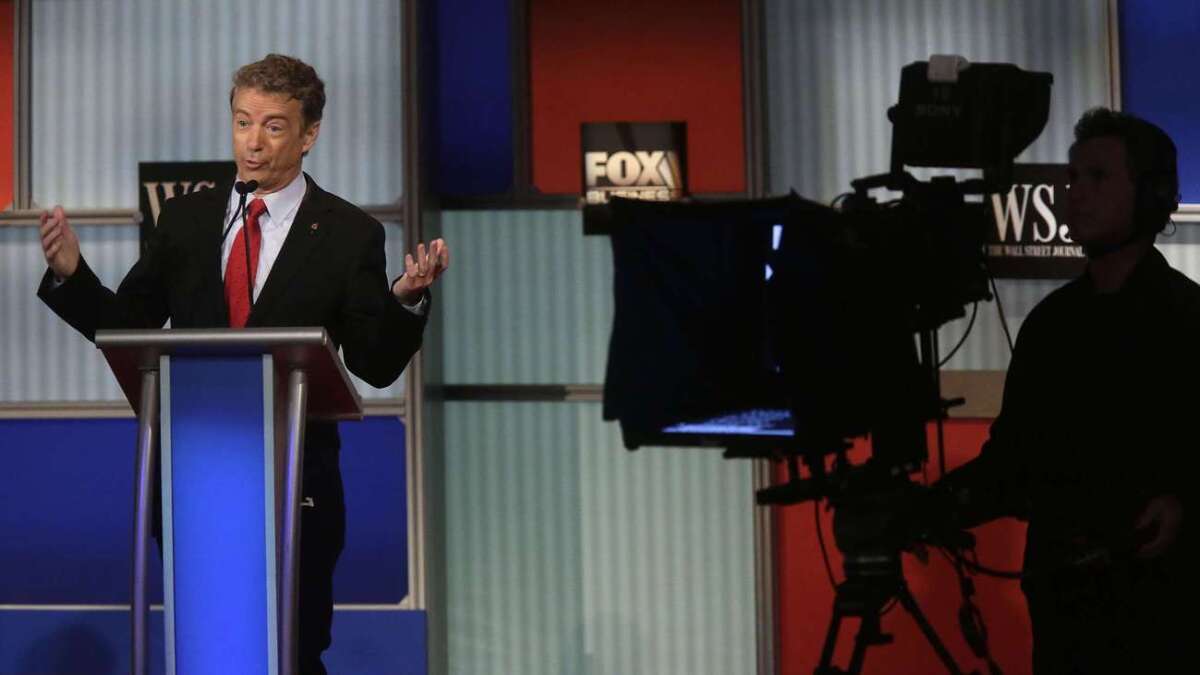
Sen. Rand Paul speaks during the Republican presidential debate in Milwaukee.
Rand Paul hung on to his spot on the main stage for Tuesday’s Republican debate, but just barely.
Paul’s standing in the polls was precarious enough that it became clear in recent days he was unlikely to be included in the main event, until debate host CNN announced Sunday that he had done well enough in a poll released hours earlier to qualify. In recent days, Paul's campaign urged CNN and the Republican National Committee to alter the qualification criteria, as they did once for Carly Fiorina.
The announcement was a bit of good news for Paul’s sputtering White House bid: His fundraising has floundered and he has failed to build momentum in the race with poll numbers stalled in the single digits for months.
Paul launched his campaign in April with the potential of building a unique coalition of the libertarian supporters who adore his father, the former Rep. Ron Paul, as well as young and minority voters who typically don’t vote Republican but are drawn by Paul’s position on issues such as privacy and the drug war.
But this coalition never came together. Businessman Donald Trump consumed the spotlight in the summer and fall, depriving many candidates, including Paul, of attention from voters and the press. Even before the terrorist attacks in Paris and San Bernardino, the Republican race increasingly focused on national security and foreign policy, tricky areas for Paul because of his noninterventionist leanings. And Texas Sen. Ted Cruz, who is surging in Iowa, has drawn the support of the tea party voters and libertarians who would have fit as natural Paul supporters.
Paul hasn’t cracked double digits in national polls since May, and since June in Iowa and New Hampshire, the states that hold the first two nominating contests.
The CNN-sponsored debate in Las Vegas is the first on the Republican side to factor in national and state polling. To qualify for the prime-time stage, candidates needed to average a minimum of 3.5% in national polls or 4% in polls in Iowa or New Hampshire, between Oct. 29 and Dec. 13.
New Jersey Gov. Chris Christie, who was relegated to the undercard debate during the last face-off, clawed his way back to the main stage based on surging numbers in New Hampshire.
Rand Paul remains on the main debate stage as Chris Christie bounces back
Rand Paul has lived to debate another day – at least on the prime-time debate stage.
The Kentucky senator, who once was believed to be a viable contender for the GOP presidential nomination but whose campaign has gained little traction, will remain on the main debate stage Tuesday night in Las Vegas, CNN, announced Sunday. The cable network is hosting Tuesday's forum.
Paul had faced a strong possibility of being bumped down to the undercard debate due to dismal polling numbers.
In a news release issued Saturday evening, Paul’s campaign had outlined a handful of reasons, including certain polls and the strength of his campaign infrastructure, that his supporters believed should allow him to remain on the main stage. CNN said he had shown sufficient strength in Iowa, where the season's first contest takes place, to be included.
And after settling for the so-called happy hour debate last month in Milwaukee, New Jersey Gov. Chris Christie will rejoin other top Republican presidential hopefuls in the main debate on Tuesday. He showed sufficient backing in New Hampshire, the election cycle's other kickoff state.
Christie, who this month netted the endorsement of the New Hampshire Union Leader, a respected newspaper voice in the first-in-the-nation primary state, will be joined by Paul and seven other candidates on stage at the CNN/Facebook debate.
The others include:
Donald Trump
Ted Cruz
Ben Carson
Marco Rubio
Jeb Bush
Carly Fiorina
John Kasich
Trump warns GOP leaders against talk of brokered convention
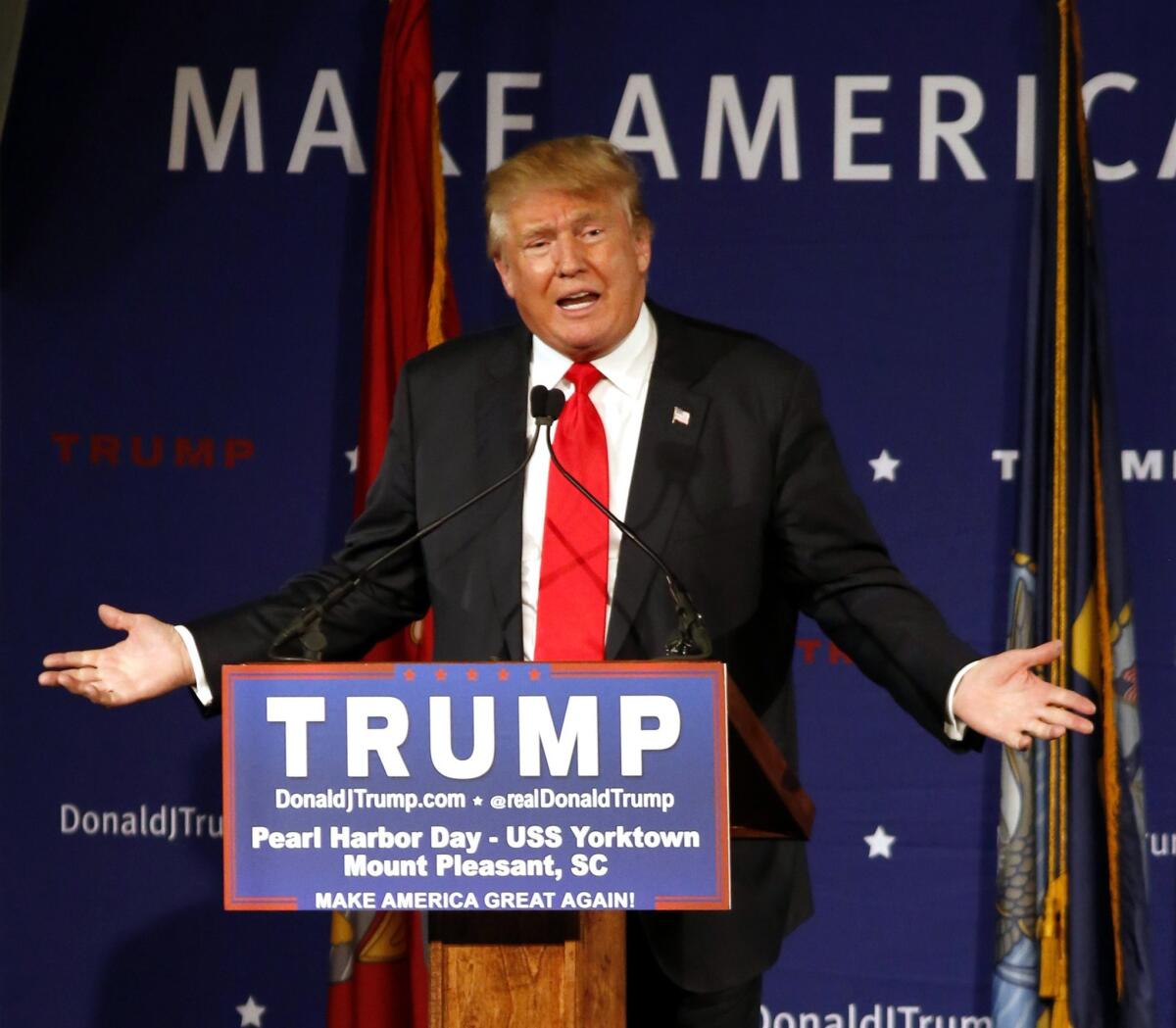
Republican presidential candidate Donald Trump campaigns in South Carolina.
Donald Trump warned Republicans that talk by party leaders about possible efforts to block his rise "wasn’t the deal I made” when he pledged stay in the party.
"I'm disappointed" by reports that party leaders, at a recent dinner in Washington, talked about the possibility that at the nominating convention this summer officials could band together to try to block him from winning, Trump said in an interview with CNN's Jake Tapper aired Sunday.
The pledge to support the party's eventual nominee, which Trump signed earlier this fall, depended on both sides being fair, Trump said.
Trump leads most national GOP polls and surveys in several states with early primaries, and "they're going to have to live with it," he said.
Trump has repeatedly made thinly veiled threats that he could bolt the GOP and run an independent presidential campaign. One recent poll showed that more than two-thirds of his supporters would stick with him if he did so, which would likely doom to defeat whoever did win the Republican nomination.
Trump also defended his proposal to ban most Muslims from entering the U.S., saying "I’m doing the right thing. Our country has a problem," he said.
And he disagreed with Supreme Court Justice Antonin Scalia, who made a remark during a recent high court argument in which he suggested that black law students might be better off if they attended less competitive law schools, rather than gaining admission to the top schools.
"I don't like what he said," Trump told Tapper. "His remarks were very tough" for black Americans.
In Iowa, Ted Cruz's support continues to gain momentum
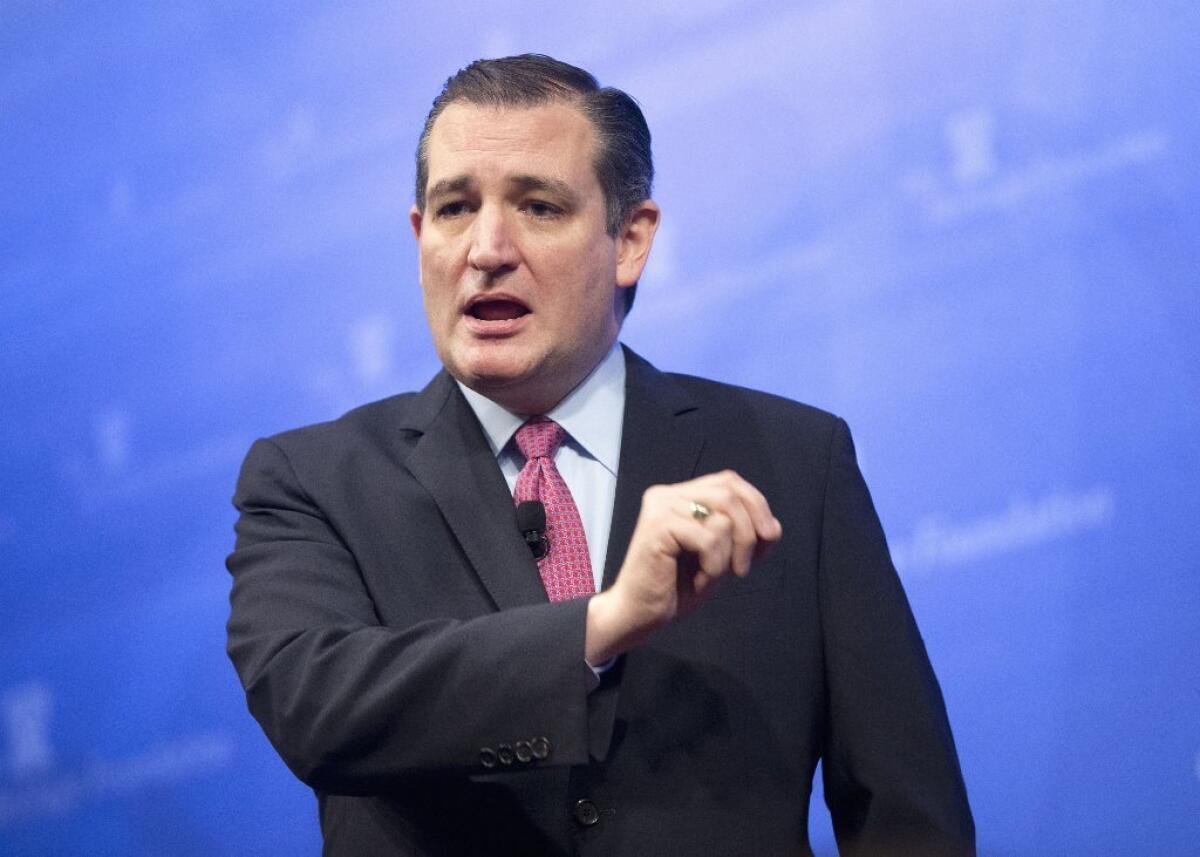
Republican presidential candidate Sen. Ted Cruz (R-Texas) speaks at the Heritage Foundation in Washington last week. He leads by a wider margin in a new poll in Iowa.
Sen. Ted Cruz of Texas has taken a substantial lead among Republican presidential candidates in the Iowa caucus, leading second-place Donald Trump by 10 percentage points in a survey released Saturday night.
The Des Moines Register/Bloomberg Politics poll confirmed a recent trend that has shown Cruz gaining in the state, which holds the first contest in the presidential primary and generally supports culturally conservative candidates in its Republican caucuses. A poll released earlier this week showed Cruz leading Trump by 5 percentage points.
Trump and retired neurosurgeon Ben Carson had led in most other polls taken in recent months.
By the numbers
Get the L.A. Times Politics newsletter
Deeply reported insights into legislation, politics and policy from Sacramento, Washington and beyond. In your inbox three times per week.
You may occasionally receive promotional content from the Los Angeles Times.







